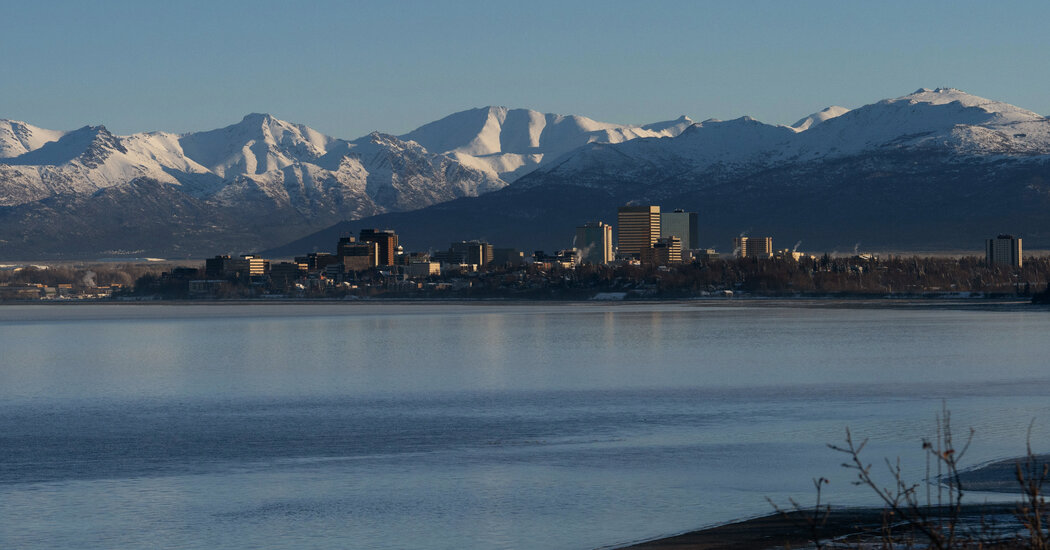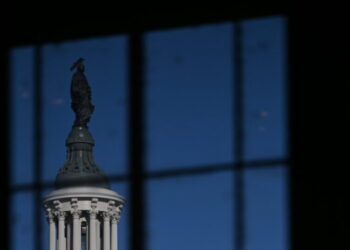
The largest city in Alaska is about to undertake an experiment that feels both inevitable and impossibly futuristic in an era of pervasive mistrust toward elections: allowing all voters to cast ballots from their smartphones.
Anchorage, home to about 240,000 registered voters, is starting small. Mail and in-person voting will still exist, but voters will also be able to open a link on their phones to cast a ballot in municipal races in April, when six city assembly seats and two school board seats are up for election. The change will not apply to higher-profile races later in the year for state legislature, governor and federal offices.
But even at the local level, the trial run of phone voting — the first of its scale in the nation — could offer a blueprint for expanded use in future elections beyond Alaska.
The cautious technological step forward is designed to help offset Alaska’s logistical challenges: harsh weather, long drives to vote in rural areas, a transient population and, for Anchorage itself, a large military base nearby. Lots of ballots never get delivered, and plenty more arrive too late to be counted. Local election officials hope that the phone experiment will make it easier to vote, while also keeping their elections secure.
“We have a high transient population — military, oil and gas, fishing, tourism — our people are always on the move,” said Liz Edwards, the election administrator in Anchorage. “And so we’ve been trying to make it even easier for them to vote and make it so you don’t really have an excuse not to vote anymore.”
Anchorage is using a platform called the Mobile Voting Project, a new nonprofit open-source program funded by Bradley Tusk, a venture capitalist and onetime adviser to former Mayor Michael R. Bloomberg of New York City. Citing an analysis by The New York Times that found that roughly 90 percent of congressional and state legislative elections were effectively decided in low-turnout primary races, Mr. Tusk has argued that mobile voting could be the secret to unlocking higher turnout in less advertised elections, so much so that he wrote a book on it.
“Primary turnout is typically 10 to 15 percent, and those are the extremes or different special interests, and they dictate who gets elected and what they do once they’re in office,” Mr. Tusk said in an interview. “And that’s why we either have totally dysfunctional government like D.C. or totally one-sided government. Neither of those things are in any way good, nor do they reflect where we are.”
But his push for phone voting comes at a time of shaken trust in elections amid the unending fallout of the 2020 election.
President Trump and his allies continue to falsely claim that his loss that year was rigged, using social media to spread falsehoods about mail ballots, voting machines and other parts of the electoral process. Right-wing election activists have clamored for paper-only elections, and election officials from both parties note that “paper cannot be hacked.”
Even if an all-digital system can be kept secure — which is far from a guarantee — some experts worry that the political environment is too volatile to even experiment with internet voting.
“I can’t imagine a worse time in American history to be rolling it out,” said David Becker, the executive director of the Center for Election Innovation and Research, a nonpartisan group that advises election officials. He noted that many conspiracy theories about mail voting persist even though the literal paper trail makes them easily refutable. Voting digitally, he argued, could ignite new baseless doubts.
“Imagine what it would be like if we made the conspiracy theorists’ jobs that much easier,” Mr. Becker said. “They can just say the votes got changed inside the machine.”
Mr. Tusk, however, believes that it is even more risky if low-turnout elections keep making the nation more polarized.
“I don’t see us being in one country in 20 years if we don’t do something very different,” he said.
Still in its infancy, internet voting is used only sporadically around the world. Estonia, which pioneered the method 20 years ago, is the only country that allows all citizens to vote online for national and local elections, albeit primarily on a computer. While the rate of turnout in Estonia’s national elections isn’t exponentially higher than that of the United States, Estonians vote in greater numbers per capita in local elections than Americans do.
Luukas Ilves, a former under secretary for digital transformation in Estonia, praised the security of online elections for two reasons: They are in fact difficult to hack, and it’s nearly impossible to do so unnoticed.
“The real question becomes, can you compromise the integrity of the process, and in particular, can you compromise it in such a way that the monitoring you’ve got in place wouldn’t detect it and that you actually therefore materially change the outcome of the vote?” Mr. Ilves said. “I’ll give you the punchline, which is unsurprising, which is no.”
To build trust and enhance security, Mr. Tusk’s team will make its software system open-sourced, publishing the code on a public forum for anyone to inspect and try to hack, hoping that such input will improve the program. The program — available only on smartphones and not on laptop or desktop computers for security reasons — will also be free for other municipalities and states to use.
Security experts say that while nothing on the internet can be completely impenetrable from hacking, advances in cloud-based technology, as well as linking mobile voting to a paper backup system, could help alleviate some of the concerns.
The system in Anchorage will include such a paper ballot backup: When a voter submits a vote via the platform, an election official will review their identification and then print out the vote on a ballot.
The clerk’s office will then tabulate those paper ballots — not the digital votes.
Before the act of phone voting, the application process also requires identification approval by an election official. Voters are then sent unique links.
Both Anchorage and Juneau, the capital of Alaska, recently ran much smaller experiments with phone voting.
In Juneau, roughly 60 of the city’s 28,000 registered voters received access to the mobile voting portal for a municipal election last month. About 30 returned ballots. Andi Hirsh, the deputy municipal clerk in Juneau, said that while the platform worked seamlessly, many parts of her district still lack good broadband access and high-speed cellular networks, which could limit the voting method’s use.
“The way I view it is that it is a great option for people who need it, but it won’t be replacing the primary way we vote for a very long time,” Ms. Hirsh said.
Internet voting has also long been utilized for military and overseas voters in many places across the country. Josh Zygielbaum, the clerk in Adams County, Colo., has used a version of internet voting for its military and overseas voters since about 2010. He is eagerly watching the Anchorage experiment.
“Remote voting has been done since the Civil War,” Mr. Zygielbaum said, referring to the various ways throughout history that military members have been able to vote. “This is just leveraging technology that already exists,” he added, saying that “I think that it could be leveraged successfully to expand voting and alter the way that Americans vote.”
But he cautioned: “I think there’s still a lot of work that has to be done. The current political environment, there’s a lot of mistrust in elections, and so it may be an uphill battle to really get this in place.”
Another obstacle for expanding the method to federal and state elections is that they have more certification requirements and stricter rules.
But in Alaska, the reaction to the early test in Anchorage was almost universally positive, Ms. Edwards said.
“We actually got a lot of selfies of people on vacation saying, ‘Thank you so much for doing this,’” she said. “Like, ‘We were able to vote from Spain.’ Or ‘Here’s a picture of us at some cathedral.’”
Nick Corasaniti is a Times reporter covering national politics, with a focus on voting and elections.
The post Will People Trust Voting by Phone? Alaska Is Going to Find Out. appeared first on New York Times.



